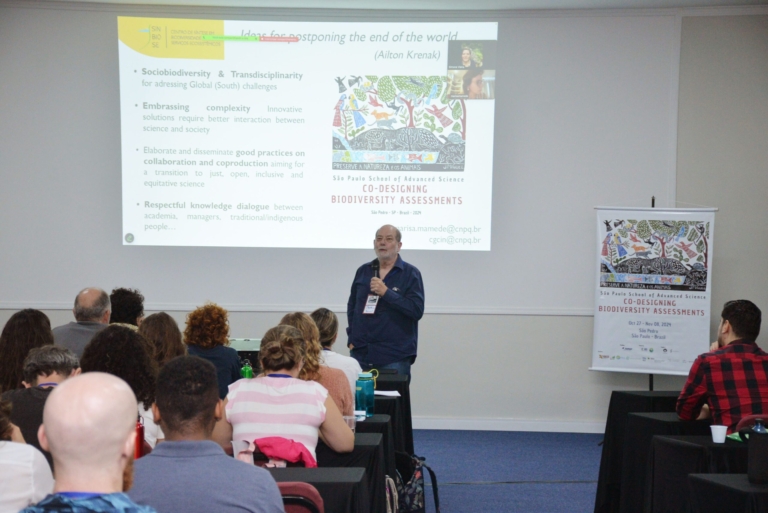The São Paulo School of Advanced Science “Co-creating Biodiversity Assessments” has begun. From more than 450 applications, 57 participants from 22 countries on four continents have been selected. They are graduate students, early career researchers, managers and technicians from the environmental field who will meet in São Pedro (SP) over the next 14 days to discuss the ways to make academic knowledge on biodiversity more practical for decision-making.
The day began with Mariana Cabral’s (USP) presentation on the São Paulo Research Foundation (FAPESP) and its importance in funding research in the State of São Paulo and Brazil. Cabral presented the funding lines for the internationalization of research and biodiversity, with special emphasis on the Biota/FAPESP program, which is 25 years old. During this period, the Biota program has covered 384 projects, involving more than 4,000 researchers and 6,000 publications (including articles and book chapters). Finally, Mariana Cabral presented the Biota Síntese project, which brings together researchers, managers and civil society to support public policies aimed at sustainability in urban and rural areas of the State of São Paulo. Since 2022, the project has produced three technical notes: on carbon biomass in the state, different financial arrangements to finance ecosystem restoration and the development of strategies to implement the state’s Climate Action Plan.
Marisa Mamede (CNPq) presented the biodiversity initiatives of the National Council for Scientific and Technological Development (CNPq), the national research funding agency, and its initiatives to fund environmental research. The Long-Term Ecological Research Program (PELD) is 27 years old. During this period, the LTER has been improved, including aspects related to data management and direct contributions to environmental management. In addition, over the years, the need to create an initiative to synthesize the knowledge already produced in the country was identified. Thus, the Center for Biodiversity and Ecosystem Services – SinBiose – was born. SinBiose was created to address complex and interrelated issues such as the climate emergency, biodiversity loss, food sovereignty and neglected tropical diseases. Finally, Marisa Mamede highlighted some of the challenges of creating a synthesis center like SinBiose that seeks to work in inter- and transdisciplinarity, in particular the role of funding agencies in promoting co-creation and evidence-based decision-making.
Rodolfo Dirzo (Stanford University, USA) spoke on “Biodiversity in the Anthropocene – Consequences for Biotic Interactions and Human Well-being”, exploring the links between biodiversity, ecological interactions and the well-being of human societies in an era marked by human impact. Dirzo examined various aspects related to deforestation and how this effect reverberates throughout the ecosystem. One striking example the researcher presented involved rats and coconut palms on Palmyra Atoll in the Central Pacific. The invasion of rats and coconut trees on the island has had a cascade of negative effects on the composition of native species, affecting the structure of the local forest and the roosting sites of birds that do not nest in these trees. As a result, deforestation has negatively affected coastal and marine ecosystems.
The day ended with a presentation by Thomas Lewinsohn, coordinator of the School, on the expectations for this period. For the researcher, there is a mismatch between the production of knowledge and its practical use, and one of the School’s central proposals is to promote the integration of this knowledge, improving the alignment between the creation and practical application of information. To this end, Thomas Lewinsohn emphasizes the importance of creating a collaborative environment where people can freely exchange ideas and work together, and it is essential that the insights gained are applied to real problems, experiences are shared, and new partnerships are formed. In addition, the researcher emphasized that the knowledge generated during the school should be organized in practical language and formats that make it easy to use and understand for everyone involved.
